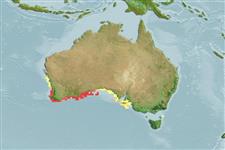Classification / Names
आम नाम | उपशब्द | Catalog of Fishes(वर्ग, प्रजाति) | ITIS | CoL | WoRMS | Cloffa
>
Ophidiiformes (Cusk eels) >
Dinematichthyidae (Viviparous brotula)
Etymology: Dermatopsoides: Greek, derma = skin + Greek, opsis = appearance (Ref. 45335); morrisonae: Named for Sue M. Morrison, Perth, WAM..
More on authors: Møller & Schwarzhans.
Environment: milieu / climate zone / depth range / distribution range
पारिस्थितिकी
समुद्री ड़िमरसल; गहराई सीमा 5 - 10 m (Ref. 57886). Tropical
Eastern Indian Ocean: Western Australia.
आकार / वज़न / Age
Maturity: Lm ? range ? - ? cm
Max length : 2.9 cm SL (female)
Short description
पहचान कुंजी | आकृति विज्ञान | मौरफोमैटरिक्स
पृष्ठीय सौफट रेज़ (सम्पूर्ण) : 72 - 76; ऐनल सौफट रेज़: 52 - 54; जानवरों की रीड़ का जोड़: 42 - 44. The species is characterized by the following: vertebrae 13-14 + 28-31 = 42-44, dorsal fin rays 72-76, anal fin rays 52-54; scales present on body; dorsal and anal fins dark; snout terminal; lower lip with skin folds; ventral fin length 15.8-18.5 % SL; posterior nostril moderately small, more than half the size of eye; lower preopercular pores 3, small; weak ventral spine on
maxilla positioned behind rear of eye (Ref. 57886).
Life cycle and mating behavior
Maturities | पुनरुत्पत्ति | Spawnings | Egg(s) | Fecundities | लार्वा
Møller, P.R. and W. Schwarzhans, 2006. Review of the Dinematichthyini (Teleostei, Bythitidae) of the Indo-west Pacific, Part II. Dermatopsis, Dermatopsoides and Dipulus with description of six new species. The Beagle 22:39-76. (Ref. 57886)
IUCN Red List Status (Ref. 130435)
Threat to humans
Harmless
Human uses
साधन
Special reports
Download XML
इंटरनेट स्रोत
Estimates based on models
Preferred temperature (Ref.
123201): 17.4 - 18.4, mean 18.1 °C (based on 44 cells).
Phylogenetic diversity index (Ref.
82804): PD
50 = 0.5625 [Uniqueness, from 0.5 = low to 2.0 = high].
Bayesian length-weight: a=0.00389 (0.00180 - 0.00842), b=3.12 (2.94 - 3.30), in cm total length, based on all LWR estimates for this body shape (Ref.
93245).
Trophic level (Ref.
69278): 3.1 ±0.5 se; based on size and trophs of closest relatives
Fishing Vulnerability (Ref.
59153): Low vulnerability (10 of 100).
